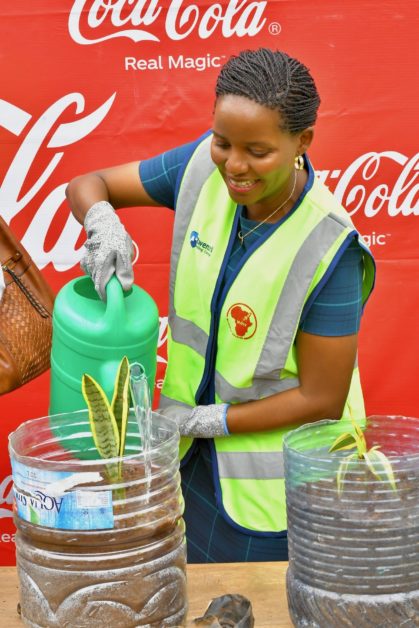Coca-Cola Beverages Uganda (CCBU) through its initiative, Plastic Recycling Industries (PRI) has today partnered with Stanbic Bank Uganda to further reduce plastic waste in Uganda.
This partnership is part of CCBU’s environmental sustainability programme that seeks to create a world without waste. CCBU, which is part of The Coca-Cola Company, shares in the larger Group’s ambition of making 25% of its packaging reusable by 2030, collecting for recycling the equivalent of 100% of packaging sold and creating packaging that is at least 50% recycled material by 2030.
This is as a 2022 report by the National Research Repository of Uganda (NRU) indicated that the importation and usage of plastics and plastic packaging in Uganda had increased six-fold within the last three years, further escalating the challenge for sustainable management and recycling of plastic waste.
Speaking at the partnership launch event at the Plastic Recycling Industry (PRI) plant in Nakawa, Kirunda Magoola, the CCBU Public Affairs, Communication and Sustainability Director highlighted that waste management is a collective effort that requires stakeholders to come together.
“Our commitment is to invest in our planet and environment. That’s why for every bottle that we produce, we are determined to collect the equivalent. Last year, we were able to attain 85% of this target while collecting PET waste wherever we found it,” said Kirunda, adding that the company intends to make all consumer packaging 100% recyclable by 2025.

Under the partnership, Stanbic Bank will work with CCBU to identify designated collection spaces for used plastics that will serve as plastic waste collection centres around Uganda and ensure appropriate security and maintenance of the collection centres, as well as provide appropriate messaging to the public regarding environmental protection.
“We are happy to be part of an initiative that cares for the environment and people. Poorly disposed of plastic waste damages the environment, land, and water. We, therefore, need to work together towards creating a world without waste,” said Anne Juuko, the Stanbic Bank CEO.
“Environmental protection is not a ‘you, or ‘me’ problem. It is an ‘all of us’ problem. And it is not just for us today, it is also for our children and children’s children, it is our generation’s agenda,” Juuko added.
Explaining why Stanbic Bank was participating in the partnership with CCBU, Juuko said that “the single biggest tool we have in the fight against environmental degradation is awareness,”.
She said that the bank annually spends up to UGX5 billion on environmental protection-related initiatives such as the ‘Running Out of Trees’ (ROOTS) campaign in partnership with Uganda Breweries Limited and the ‘Taasa Obutonde’ campaign in partnership with Next Media Services.
She also said the bank has in place a wide range of green financing products that offer preferential rates to green projects.
“If you are into anything green, anything environment, please come talk to us. The difference in lending rates is somewhere between 400-700 basis points,” she said.
Present at the launch was the National Environment Management Authority (NEMA) Corporate Communications Manager, Naomi Karekaho, who applauded CCBU and Stanbic Bank for working together. She noted that plastic pollution is one of the biggest environmental concerns due to the increase of single-use plastics and poor disposal habits by the public.
“I am happy to see corporate entities like CCBU and Stanbic Bank make a valuable contribution towards waste management and environmental conservation. Their efforts are worth emulating,” Karekaho said.
Karekaho said that plastics, climate change and pollution were some of the biggest modern-day threats to the environment.
